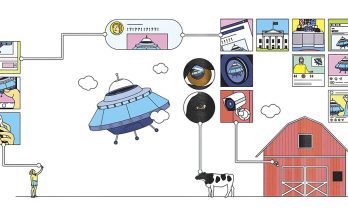“Software has been around since the 1940s. Which means that people have been faking their way through meetings about software, and the code that builds it, for generations. Now that software lives in our pockets, runs our cars and homes, and dominates our waking lives, ignorance is no longer acceptable. The world belongs to people who code. Those who don’t understand will be left behind.
This issue comprises a single story devoted to demystifying code and the culture of the people who make it. There’s some technical language along with a few pretty basic mathematical concepts. There are also lots of solid jokes and lasting insights. It may take a few hours to read, but that’s a small price to pay for adding decades to your career.”
—Josh Tyrangiel
What Is Code?
BusinessWeek, June 11, 2015
by Paul Ford
You are an educated, successful person capable of abstract thought. A VP doing an SVP’s job. Your office, appointed with decent furniture and a healthy amount of natural light filtered through vertical blinds, is commensurate with nearly two decades of service to the craft of management.
You have a reputation throughout the organization as a careful person, bordering on penny-pinching. The way you’d put it is, you are loath to pay for things that can’t be explained. You expect your staff to speak in plain language. This policy has served you well in many facets of operations, but it hasn’t worked at all when it comes to overseeing software development.
For your entire working memory, some Internet thing has come along every two years and suddenly hundreds of thousands of dollars (inevitably millions) must be poured into amorphous projects with variable deadlines. Content management projects, customer relationship management integration projects, mobile apps, paperless office things, global enterprise resource planning initiatives—no matter how tightly you clutch the purse strings, software finds a way to pry open your fingers.
Here we go again. On the other side of your (well-organized) desk sits this guy in his mid-30s with a computer in his lap. He’s wearing a taupe blazer. He’s come to discuss spending large sums to create intangible abstractions on a “website re-architecture project.” He needs money, support for his team, new hires, external resources. It’s preordained that you’ll give these things to him, because the CEO signed off on the initiative—and yet should it all go pear-shaped, you will be responsible. Coders are insanely expensive, and projects that start with uncomfortably large budgets have an ugly tendency to grow from there. You need to understand where the hours will go…
—Paul Ford
Supporting Articles
What Is ‘What Is Code?’: Behind the scenes of Bloomberg’s 38,000-word opus.
MotherBoard News. Jun 12, 2015
by Clinton Nguyen
When Bloomberg Businessweek told him it was going to give him the whole magazine to write a single article about computer programming, Paul Ford, a soft-spoken programmer and writer, sat on his couch with a pillow over his head and just let out a long “aaaaaaahhhhh,” like he had just stuck his finger on the ‘A’ key.
Ford’s piece started out as a 2,000-, then 4,000-word piece. It grew much longer from there, demanding the efforts of a team of editors, graphic artists and web developers to make it what it is now: An interactive primer that not only teaches how computers process code, but commits code as part of its narrative. This turned into “What Is Code?”
What I learned by reading Businessweek’s incredible 38,000-word article on code
Business Insider, by Matt Rosoff, June 14, 2015
Bloomberg Businessweek has devoted an entire issue to a single article: Paul Ford’s “What is Code?”
I read the whole thing online this afternoon, and it’s remarkable. I could see it being taught in journalism classes years from now, like Gay Talese’s “Frank Sinatra Has a Cold” or John Hersey’s “Hiroshima.”
It takes something both very important and hard to understand, and makes it understandable to an audience of smart but nonexpert readers. It does this incredibly well. It mostly feels like fun, not work.
It also contains the best use of interactive elements in a story that I’ve ever seen. The demos aren’t just there to show off. They’re embedded in the story and make it better — anybody who lived through desktop computing in the 1990s will laugh out loud at the Java “demo.”
Paul Ford on ‘What Is Code?’ and why we should care
Marketplace Tech, by Ben Johnson, June 12, 2015
We are surrounded with computer code every day. It has built the hardware and software we interact with, from our computers and mobile devices to social networks. It’s changed the way we communicate, do business and conduct our work. But most of us don’t know what code is, really. If the code works, you don’t even know it’s there — and that’s by design. Paul Ford says it shouldn’t be that way. His argument and explainer is laid out in a more than 30,000-word piece for the latest issue of Bloomberg Businessweek.
Marketplace Tech Host Ben Johnson sat down with Ford to talk about why he wrote the piece and why we should care enough to read it, top to bottom.
Here are some highlights from the interview:
Do you think the average user needs to understand code?
You know, I really honestly do. And obviously, you know, part of me is going like, “Read the article.” Because that’s who this is written for: it’s for the educated civilian who is surrounded by software.
If you want to understand why there’s so much happening in that world, and why suddenly this fairly small cohort has such unbelievable cultural power, it’s worth knowing about the fundamental structures.
Read the article & Listen to the Story »
What is Code? For Lawyers, in Well Under 38,000 Words
FindLaw for Legal Professionals, by Casey C. Sullivan, Esq. on June 12, 2015
If you’ve been watching your Facesnaps, Twitbooks or NSA data collection feeds lately, you’ve probably seen more than one share of writer and programmer Paul Ford’s “What is Code?” article. The immersive, experience-based feature attempts to lay out the basics of code for a lay audience, in just around 38,000 words.
But what does code mean for lawyers?
It’s All Just Rules, Really
Before getting to what code is, why would lawyers even need to understand it? Understanding the basics of code, like understanding the basics of accounting, is part of operating a functional practice. As more and more legal practices take up electronic discovery, Internet marketing, cloud-based document sharing and the like, understanding code will help you know just what goes on under the hood. You don’t need to be an expert, but a bit of familiarity won’t hurt.






